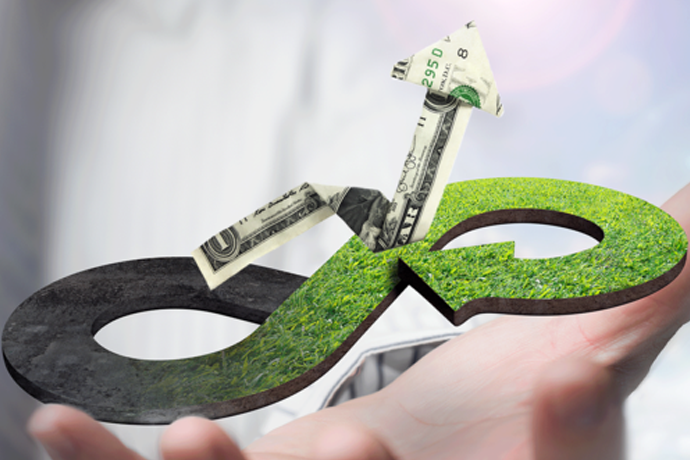The Trillion-Dollar Question: How to Capitalize on the Clean Economy?

by Jessica Butts, Senior Director at The Delphi Group
GLOBE Capital and Capital Exchange 2019 brought together experts in finance, infrastructure and cleantech to figure out how to accelerate the shift to a lower-carbon economy. Panelists and attendees discussed the challenges and opportunities associated with moving investment dollars into the clean economy, and made headway into answering the trillion-dollar question.
The shift to a low-carbon economy is a multi-trillion-dollar opportunity
At the GLOBE Capital 2019 panels “2 Degree and Rising” and “Mainstreaming Low-Carbon Investment”, panelists recognized the opportunity associated with the Paris Agreement commitments: $23 trillion in climate-smart investment opportunities in emerging markets alone, in addition to investment or job growth in developed markets. There are significant opportunities for entrepreneurs, investors and individuals to benefit from developments in energy efficiency, agtech, electric vehicles, cleantech solutions, renewable energy, circular business models and more.
The “Circular Economy” panel discussed the limitless possibilities that exist when we re-think how we design, build, sell and use products and services to minimize waste and make the most of our resources. Areas that over-contribute to waste, such as fashion and food, are investing in new solutions and beginning to rethink their business models. The success of car sharing companies, which provide mobility using fewer resources, demonstrates companies in a circular economy can thrive.
There are still questions around how we can better capture economic value and productivity gains in the circular economy, in addition to how we create value from waste and how we shift cultural norms and behaviours. More collaboration between and action from governments, corporations and society are needed to come up with answers – we look forward to having these conversations with you at future GLOBE Series events!
Responsible investment strategies are on the rise
The opening plenary at GLOBE Capital 2019 dug into the question of how we’re moving investment dollars into the clean economy – “the trillion-dollar question.” Around has been pledged for responsible investment. Commonly used responsible investment strategies include:
- The exclusion from a fund or portfolio of certain sectors, companies or practices based on specific environment, social and governance (ESG) criteria. This is one of the most commonly used strategies.
- Positive/best-in-class screening: Investment in sectors, companies or projects selected for positive ESG performance relative to industry peers.
- ESG integration: The systematic and explicit inclusion by investment managers of ESG factors into financial analysis.
- Sustainability themed investing: Investment in themes or assets specifically related to sustainability (for example clean energy, green technology or sustainable agriculture).
- Corporate engagement and shareholder action: The use of shareholder power to influence corporate behavior, including through direct corporate engagement (i.e., communicating with senior management and/or boards of companies), filing or co-filing shareholder proposals, and proxy voting that is guided by comprehensive ESG guidelines.
One of the primary frameworks driving ESG integration is the Task Force on Climate-Related Financial Disclosures (TCFD). Supporting the adoption of the TCFD recommendations is a high priority for the United Nations-supported Principles for Responsible Investment (PRI), the global framework for translating information about climate change into financial metrics. Starting in 2020, 2,250 PRI signatories -representing $83 trillion in assets under management – will be obligated to include TCFD-based reporting as part of their disclosure requirements.
Because of the TCFD, as well as increasing recognition from institutional investors that climate and other ESG factors should be factored into the risk assessment of a company and/or financial instrument, dollars are moving towards more climate-friendly investments.
10 ideas for moving more dollars into the clean economy
Throughout Capital Exchange and GLOBE Capital, panelists and attendees proposed ideas on how we can drive even more dollars towards a clean economy. Their ideas included:
- Bring high net-worth individuals into the conversation. As owners of $66 trillion in assets, they have the opportunity to shift significant amounts of capital into the clean economy.
- Develop public-private partnerships to help fund infrastructure projects, such as smart cities, public transit, and renewable energy projects.
- Shift our own buying habits away from disposable, limited-use products and toward sustainable ones. By increasing demand and revenue for companies producing more sustainable products, it sends a clear market signal.
- Capitalize on low-hanging fruit within corporations, such as improving operational efficiencies. Companies that utilize capital more efficiently are likely to attract investors.
- Think big, utilize systems thinking and collaborate to create innovative solutions that are applicable across industries.
- Understand and design regulatory policies that send a clear signal to investors and businesses that Canada is committed to shifting towards a clean economy and meeting its Paris commitments.
- Improve disclosure on climate- and other ESG-related risks and opportunities.
- Create more financial products that allow for capital to flow to the clean economy, without greenwashing.
- Continue to support and drive cleantech innovation.
- Connect and invite others into the conversation about the clean economy.
The connections, conversations and ideas fostered during the GLOBE Capital events illustrated that we already have many of the answers we need to make the most of the trillion-dollar opportunity. It’s up to us to capitalize on it.
Jessica Butts is a Senior Director at The Delphi Group. For more information about investment in the clean economy or Delphi’s Sustainability and Corporate Social Responsibility Services, please contact Jessica directly at jbutts@delphi.ca.
Categories

